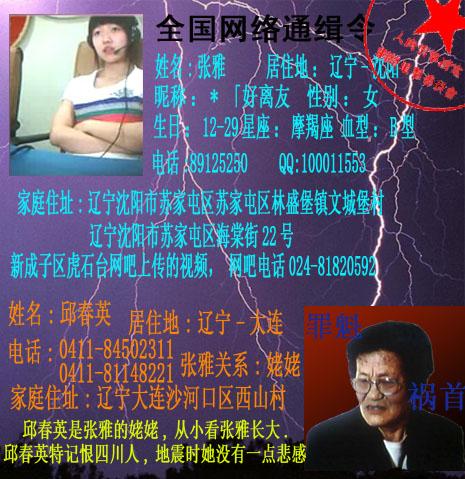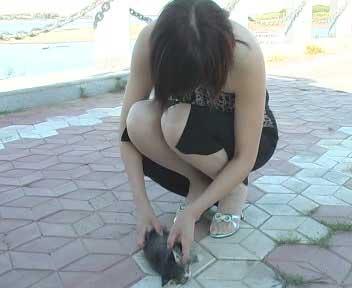| Human flesh search engine is a uniquely Chinese phenomenon? | |
|---|---|
| Jul 2, 2008 02:32 | |
 | Do you still remember Gao Qianhui? The 21-year-old girl from Northeastern Liaoning Province sat down in front of her webcame and filmed a 5-minute spew of vitriol on the the victims of Wenchuan Earthquake. She posted her video on the internet. The vast number of Chinese netizens launched a "human flesh search engine". All the details about her and her family were posted on the internet. She was critized by Chinese net users and finally was arrested by the police. Chinese netizens were described as "cyber-vigilantes" by overseas media. The following is an excerpt from Times Online: "Human flesh search engine" found out every detail about Gao Qianhui: her real name, ID, her family connections.  |
| Jul 2, 2008 02:34 | |
 | (Source: Times Online) Human flesh search engines: Chinese vigilantes that hunt victims on the web A new phenomenon is sweeping China after the quake: digital witch hunts of those who dare to be outspoken or criticise Hannah Fletcher She looks like any other disgruntled young person. Arms tightly crossed, mouth twisted in contempt, she could be letting off steam about parents, school, or boyfriends. But when 21-year-old Gao Qianhui sat down in front her webcam last month, she had far more important issues on her mind. Upset that the three-day mourning period for the 80,000 victims of the earthquake in southwest China had disrupted her television viewing schedule, she launched into a five-minute spew of vitriol and then posted the video online. "I turn on the TV and see injured people, corpses, rotten bodies... I don’t want to watch these things. I have no choice.” Ms Gao sighed: “Come on, how many of you died? Just a few, right? There are so many people in China anyway.” Within hours, Ms Gao had become the latest victim of a human flesh search engine, where Chinese netizens become cyber-vigilantes and online communities turn into the world’s largest lynch mobs. Using the vast human power behind the Chinese web, every detail of Ms Gao’s life, from her home and work address in Liaoning province, north east China, to the fact that her parents were divorced, was dug up and published on hundreds of forums and chatrooms. “Now humiliate her,” ordered one internet user, Yang Zhiyan. The outraged reaction to the video drew the attention of the local police and they detained Ms Gao the next day. They did not make clear what law she was alleged to have broken. Ms Gao was the fifth person to be targeted by a human flesh search engine since the 8.0-magnitude earthquake ripped through Sichuan province on May 12.  |
| Jul 2, 2008 02:36 | |
 | With their vast number of participants and angry nature, these witch hunts for a digital age are a uniquely Chinese phenomenon. Xujun Eberlein, the Chinese-American writer and observer, said: “China’s population makes it easy to mobilize a large number of netizens to participate in such a search, especially considering that there are many smart and reasonably well-educated people in China who are intellectually underemployed." She added: “I think there is some pleasure in the idea of making information available when there has been such significant suppression of both thoughts and facts over the previous five decades.” According to Ms Eberlein, the term “human flesh search engine”, a literal translation of the Chinese, was first coined in 2001 when an entertainment website asked users to track down film and music trivia. With 210 million Chinese wired up to the internet, it was a powerful concept. It quickly caught on and came to be used as a tool to punish the perpetrators of extra-marital affairs, domestic violence and morality crimes. In one infamous case in 2006, a woman now dubbed “the kitten killer of Hangzhou” posted a video of herself stomping a kitten to death with her stiletto heels. China’s netizens erupted with rage and hundreds of amateur sleuths traced the video to Hangzhou, a city south of Shanghai. They discovered the woman’s name and that she had recently purchased a pair of high-heeled shoes on eBay. They attacked her until she apologized on a local government website and lost her job. “Righteousness is one of the five virtues in the Confucian tradition,” Ms Eberlein said. “With the convenience of the internet, and in the case of non-responsive law, the righteous people took matters into their own hands.”  |
| Jul 2, 2008 20:07 | |
 | Gao qianhui is a callous girl. How did her parents foster her? IMO, " human flesh search engine" is a positive thing. Chinese netizens become cyber-vigilantes. Those bad guys are punished by the public opinion. |
| Jul 2, 2008 23:17 | |
 | "cyber-vigilantes" "lynch mobs" IMO, it is not uniquely Chinese. Netizens over the world are a bunch of lynch mobs (or cyber-vigilantes). Huh, I am one of them. |
| Jul 6, 2008 03:42 | |
 | A woman puts the small kitten on the ground and later steps on it with her high-heeled shoes and kills the cat. She was lynched by the net mobs. |
Post a Reply to: Human flesh search engine is a uniquely Chinese phenomenon?







 Copyright © 1998-2026 All rights reserved.
Copyright © 1998-2026 All rights reserved.